Julius Caesar

Label: Intrada Excalibur Collection
Catalogue No: MAF 7056D
Release Date: 1995
Total Duration: 53:06
UPN: 7-2025-87056-2-4
Sinfonia of London conducted by Bruce Broughton
MGM’s prestigious 1953 production of JULIUS CAESAR remains a powerful film even today and is one of the finest examples of filmed Shakespeare. No expense was spared on creating a prestigious production which utilized an impressive cast of some of the most talented screen and stage actors of the day. The dramatic effect was boosted by the utilization of stark black and white photography. The producer and director originally wanted Bernard Herrmann to score the film but the studio preferred to use Rozsa who was under a studio contract. The attitude among the top brass seemed to be “why pay another composer when we have Rozsa on the payroll”. Herrmann was disappointed at not getting the assignment but nevertheless complimented Rozsa on the completed score and was so impressed by it that he later recorded selected highlights for Decca records. I was intrigued when I first heard that Intrada was going to record JULIUS CAESAR because there is so very little music contained in the film. However, this new recording reveals that much of the music which Rozsa composed was ultimately not used, as so often happens in filmland. With the music now restored, the score totals nearly 54 minutes. In many ways it is an atypical score for Rozsa.
Although set in Roman times Rozsa did not attempt an archaic style in the manner of QUO VADIS even though it does contain a fair number of fanfares and marches. Rozsa felt that the film was essentially a timeless drama and required a score of dark brooding intensity. As such, it has more in common with the composer’s forties thrillers than the later historical films. The style draws comparisons with Rozsa’s Oscar winning score for A DOUBLE LIFE, which also featured a Shakespearean tragedy albeit in a play within the film. There is not a great deal of thematic material, in fact it is one of Rozsa’s most limited in that regard, but whereas a lesser composer might have had difficulty in sustaining interest with such a limited palette, Rozsa manages to add constant variety to the score through variants on themes and motifs.
It was Rozsa’s idea to open the premiere of the film with a Shakespearean Overture but unfortunately Rozsa’s composition was replaced by the studio in favour of a performance of Tchaikovsky’s Capriccio ltalien. The rejected Overture has been recorded on 2 previous occasions, one of which Rozsa himself conducted but those versions were based on an adaptation which changed the original considerably. The Overture on this CD is the first time that it has been recorded as written and it is immeasurably superior to the revised version, which raises the question of why Rozsa ever altered it in the first place. The Overture ends on a riveting passage of orchestral savagery which is almost unique in a Rozsa film score. The main title or Praeludium, as the cue is titled, centres on the powerful theme for Caesar (which later becomes Anthony’s theme also).
The music is well played by the London Sinfonia but comparison with the film reveals that the tempo (always one of the difficult things to capture in a re-recording) is considerably slower. The tempi of most of the other music in the film soundtrack are difficult to judge because so much was dubbed at a very low level. One exception where the music was allowed to make an impact was the cue The Scolding Winds where the music imitates the howling winds and the thunder and lightning. Only about a minute of Brotus’ Soliloquy was used in the film but this recording allows us to hear the full six minute cue which, with the strings imparting a brooding bittersweet quality, is one of the most attractive pieces of music in the score. Typical frenzied battle music punctuates Battle at Philippi before leading to the climax of the tragedy with the lengthy cue Caesar Now Be Still in which the Caesar/Anthony theme relentlessly gains the ascendance over that for Brutus.
The sound quality of the recording is quite stunning. It is certainly one of the most valuable recordings of Rozsa’s music having hitherto been a lost score and Intrada Records have performed an invaluable service in restoring and preserving it on CD.



